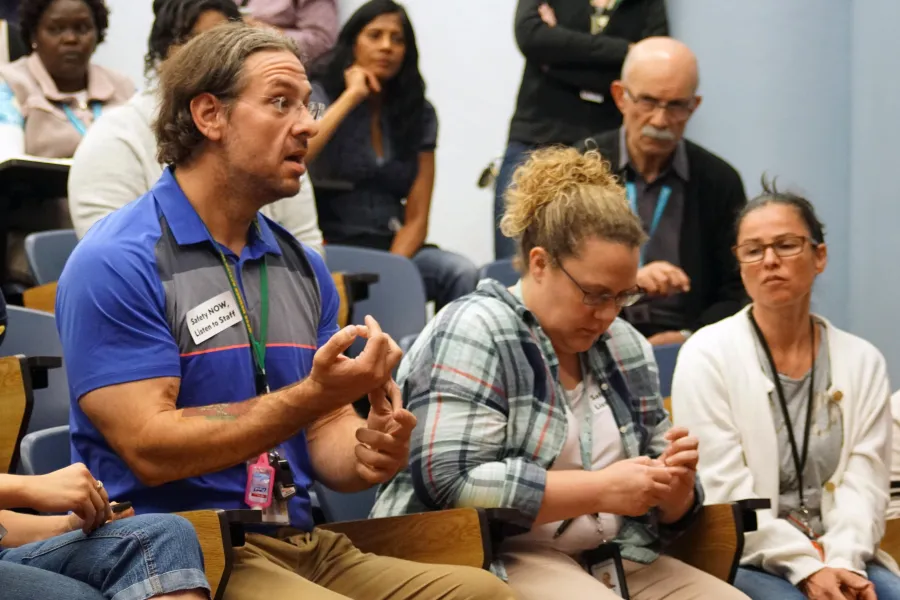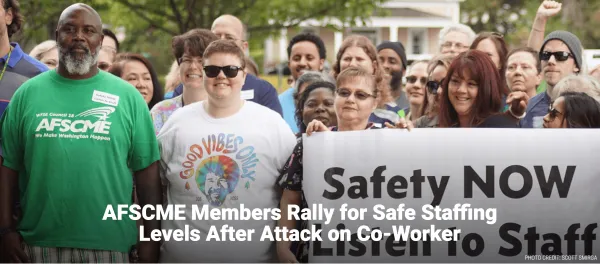WSH employees rally for safe staffing

RALLY at Western State Hospital (WSH) FRI Sep7 from 1-3pm. Gather at the flagpole.
AFSCME members in Washington state are demanding solutions to ensure worker safety after one of their co-workers – sister Christa Butters – was assaulted by a patient who had a history of violence.
9/5/18AFSCME members in Washington state are demanding solutions to ensure worker safety after one of their co-workers – sister Christa Butters – was assaulted by a patient who had a history of violence.Butters, a member of AFSCME Local 793 (Council 28), is a licensed practical nurse at Western State Hospital (WSH) with 34 years of experience serving her community. WSH is an 800-bed inpatient psychiatric hospital in Lakewood and has long been plagued by problems ranging from assaults on workers to escapes by dangerous patients.Demands:
1. Safe staffing levels (meaning more floor staff, not more management)
2. Adequate training provided across all 3 shifts
3. Fixing the physical plant of the wards to ensure safety.
Rick Hertzog, a mental health technician at WSH, said it appears management believes that assaults on workers are “just the cost of doing business.” Hertzog was himself assaulted by a patient the same day in late August when Butters was attacked by a teenage assailant and taken to intensive care.The teenager was committed to WSH after charges for assaulting a law enforcement officer last year were dismissed because he was found incompetent to stand trial. He was moved to the civil side of the facility even after he assaulted a psychiatric security attendant six months ago.
“When you see your co-workers assaulted so often in makes you wonder why you should remain so dedicated to working here,” said Mike Yestramski, a psychiatric social worker at WSH and a Council 28 executive board member.According to Hertzog, assaults at WSH are increasing and are on pace to easily pass last year’s total of 355. Members have been trying to get management to address the issue. While the hospital did recently hire 91 staff members, none of them are front-line employees who can help Butters, Hertzog and other workers.
“We tend to be short staffed on the front line, just about all of the time. The day of the attack we were short staffed in 12 of the 20 wards,” said Hertzog. “In the unit Christa was in, there were about eight on staff when there should have been 11. Since the attack, there hasn’t been any changes. In fact, we were short staffed the very next day.”
Yestramski said the problem is not just the number of staff but the training they are given and the experience they bring to the job. Too often, new caregivers are thrust into situations they have had little if any preparation for, especially when it comes to dealing with potentially violent patients. And they are having to do it under physically stressful conditions.
“How alert are you going to be when you are working your fourth double in a row?” Yestramski asked.
He and Hertzog agree that the actual number of assaults may be higher than the official count since they believe many assaults go unreported because of the two hours of paperwork required to log in every incident. Caregivers likely decide against documenting the case because that would take time away from the patients and leave their co-workers even more short-staffed.
The immediate priority for AFSCME members at WSH is to help Butters recover. She is the primary caregiver for her elderly parents, so her friends and co-workers are helping take care of their medical and emotional needs.
“AFSCME is a family and this is what being in that union family is all about,” said Yestramski.
Members held a rally for safety on Aug. 30 calling on the hospital to create a timeline for addressing the staffing issues. They also want hospital management to stop admitting patients with violent records – like the one who attacked Butters and is now in jail facing multiple assault charges – to the civil side of the facility.
“The time for talking is over,” said Yestramski. “It’s time for action.”

